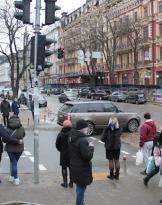On the return journey to Damascus there is a soldier in the seat next to him. It is called A. and comes from a small village in the center. Back in service after a short license. Crumpled in his woodland tells how much it happened to him three years ago.
He was a lever, serving in Yabroud, a town between Homs and Damascus. As a refueling officer he used the gun instead of the rifle: that of the petrol pump. One afternoon he receives a call from his commander who orders him to join him in a certain place on the outskirts. He obeys. At the arrival, there is no trace of the commander. He calls him on the phone but at that precise moment he is assaulted, hooded and taken away.
Recognizes the black flags hanging on the walls: it is in a den of Al Nusra militia. He is a prisoner along with his commander and other soldiers. They all fell into the same trap that evidently works. Soon other colleagues arrive until you reach the 7 number.
The jailers are Egyptians, Saudis and local Syrians. There is not too much time to reflect: they are inflated by blows for weeks. They are fed with legumes from a UNHCR warehouse where the terrorists are at home. He and others are bound in the same environment.
Every now and then someone is taken to another room to be tortured or left hanging whole hours on their hands. "I absolutely did not believe I would survive!" Says A. as we slow down for a check.
The highway that connects Damascus with the north of the country could envy ours if it were not for the continuous checkpoints and for the works not reported. On the stretch we cross two years ago there were terrorist bands ... Now everything is almost normal.
Pass a motorcycle with 4 kids above. The only one who does not laugh is the one behind, as uncomfortable as the war that goes around us. A. sees them, smiles and then shows on YouTube the video of youtube where he is a prisoner. Several times they made him dig the grave announcing the execution.
When it was time for dead, the news came that the family paid the ransom. Others like him manage to save themselves. Who does not receive money, is killed on the spot. All here the ideals of Al Nusra? Is this the holy war?
We resume traveling. He talks to me about the commander. They saved him with an exchange of prisoners. If he had not called his soldiers under the threat of arms, they would have killed him. He was an officer but A. did not judge him for it. Not everyone is heroes in Syria. Even here as elsewhere, those who play the war are almost always normal people.
Let's pass another check. In the lane for government and military vehicles are fast. The civilians instead line up. There are trucks in the column. They are Russian-made tanks, tanned by rust. We are in the desert area near Yabroud. A. has almost arrived but does not break up. When he speaks he looks into his eyes. He says he is not afraid now. He wants to continue serving his country and has a craving for revenge.
We slow down. There are other cars. Comes his friend in camouflage aboard a small motorcycle. A. his friend smile and speak Arabic. "We hope that your former commander have removed the cell phone service ..." is the first thing that comes to mind joking. It's a way to say goodbye. At the bottom is another face that we will never see again, engulfed by war and normality that will return again.
He and the other soldier leave smoking a cigarette. They smile like any boy. We start again, between the stink of gas and the sun that dies. A few miles later to the east, on the left of the highway, we see explosions. They are not distant. The roars are dark, very strong, one after the other. Traffic is immediately diverted. Snipers fire on the highway and the army recovers the area. After only 200 meters we are lined up at a check point while the artillery thunders continue, close enough. There is no panic. The war for these people has become normal, but we still lack something. Soldiers get everyone off and check bags and documents. All it takes is a blow to blow up all the cars in a row. There is no logic, there is no reason. The military is not used to Western reporters. They smile almost happy and let go.
We head south again with the cars behind still in line and an echo of thunder in the background. Looking back, we think about what happens. Everything is normal, everything is madness. Not even the time to think about it and the northern suburbs of Damascus arrive.
(photo: Online Defense)












